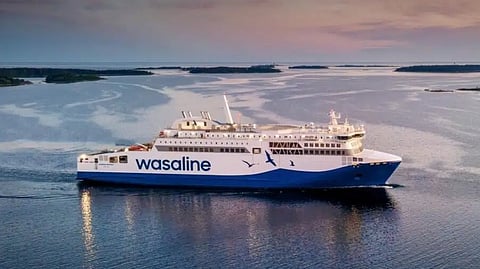Wasaline financial results remained stable in 2024 despite decreased revenue
Finnish ferry operator Wasaline has stated that its financial results for the year 2024 remained at "a good level" despite what it described as a challenging market situation.
Due to new regulations, emission trading system (ETS) fees were added as a new expense for the company. Wasaline is the only passenger shipping company in Finland that does not have an exemption from this, which naturally affects the competitiveness of the company.
The so-called Island Exemption, which grants relief from paying ETS, applies between Finland and Åland.
Wasaline continued its sustainability efforts and managed to reduce total CO2 emissions by five per cent in 2024. The use of green shore power increased by 22 per cent during the year.
At the beginning of 2024, the concept of emission-free conferences was introduced on board the Ro-Pax ferry Aurora Botnia. LNG remained the primary fuel, and as a hybrid vessel, Aurora Botnia extensively utilised its batteries. Both passengers and cargo customers have been able to offset their journeys to make them climate neutral.
Cargo metres increased by 3.2 per cent in 2024, and cargo units increased by 1.4 per cent over the same period. The number of passengers decreased by 9.4 per cent, while passenger vehicle numbers declined by nine per cent, and those of buses decreased by 1.3 per cent.
Revenue fell by 3.7 per cent, from €29.11 million (US$30.59 million) in 2023 to €28.03 million (US$29.46 million) in 2024. The operating profit amounted to €2.75 million (US$2.89 million) in 2024 compared to €2.9 million (US$3.05 million) in the previous year.
"As we enter 2025, the world continues to be marked by economic uncertainty and an accelerated green transition," said Peter Ståhlberg, Managing Director of Wasaline. "Technological advancements, particularly in sustainable innovation, are driving progress, while younger generations are placing increasingly higher demands on environmental and social sustainability.
"At the same time, trade, supply chains, and businesses globally are being affected by the climate crisis and geopolitical tensions."
Ståhlberg said that despite all the challenges, 2025 "has started well" with increased volumes and strong booking levels for both passengers and cargo.
"There are many uncertainties related to the current geopolitical situation, which impacts energy costs and emissions trading. However, travel is on the rise again, and sustainable transport is becoming increasingly important."


